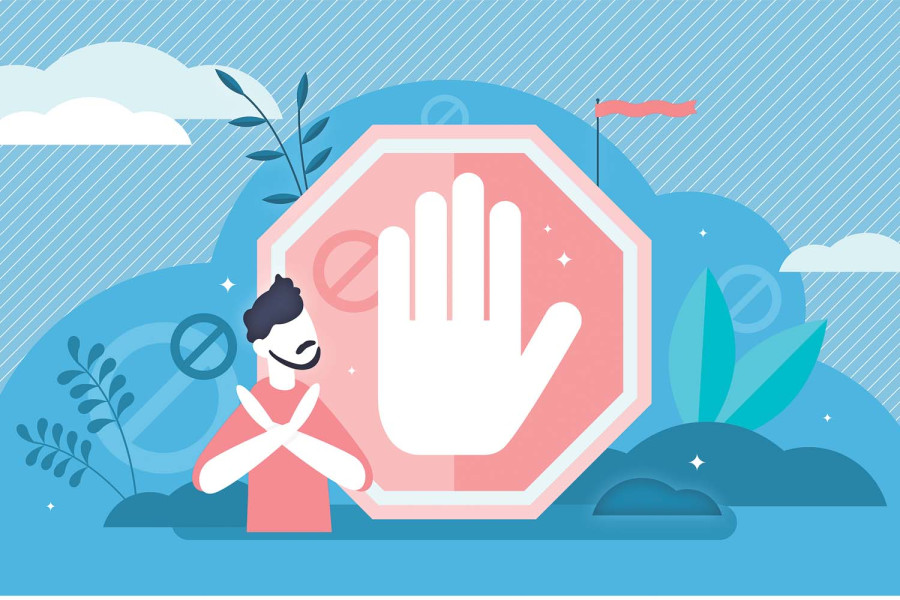Culture & Lifestyle
The power of ‘no’
A clear ‘no’ will allow you to put yourself first, to pursue your interests, improve relationships and feel confident.
Dristy Moktan
Think of someone who is always saying yes to someone else’s needs or demands. Everybody loves that person because they cater to others needs first and will gladly put themselves later. They are always ready to help and sacrifice their own work and time for others. They are probably one of the sweetest people you know.
Is this very relatable to you? Have you found yourself doing this at any point of your life? For instance, if a colleague of yours wants a helping hand and requests you to help, do you immediately say yes and leave the work that you were doing for later? Here the bigger problem is you know you have your own commitments but you feel like you should help them first because you would feel bad if you can't be there for them. If that is something you often do or feel then it's time to work on it.
People who can't say no have ingrained the habit of pleasing others and hence find it so difficult to deny their requests. Everytime you say yes you feel like you are doing the right thing but there will always be a small voice inside your head that doesn't feel good about doing so. That is because you are saying yes to others but no to yourself. The question here is when are you going to put yourself first? The time and energy you put on pursuing others interests could have been the time you work on yourself or do the things that value the most to you but you so often fail to do so.
It is very important for us to address our own needs first even if the process seems uncomfortable, especially when you are a person who is very giving. When you don’t attend to your own needs and fulfill others' needs first it only leads you toward bitterness for yourself and can turn out into a severe health issue; be it physical or psychological.
As we live in a society which fosters collectivism it can be very hard to abandon others' needs and we don't necessarily have to do so. The most crucial thing for us to understand is that, in the long run, how can we help others if we don't help ourselves first? For instance, If you are willing to assist others at the expense of missing out on your meals, sleep, and activities you enjoy. You'll gradually exhaust yourself, become unhappy, and become so drained that you won't be able to assist others. Because of this, we must first take care of our own needs. This will further give us the freedom to take care of other people's needs when we have the time and energy to do so without forfeiting our own well-being. It is similar to how, when we are on a flight, we are told to put on our own oxygen masks before assisting others with theirs. Only then will we be able to help others.
Many of us may find it extremely difficult to say no because of how our society has conditioned us. Most of the time, people agree to others' requests because they don't want to be held accountable for their shortcomings. What if I say no to them now and they aren't there to help me when I need them later? People often act unwillingly because they are afraid of being left alone in the most severe situations. Hence, we attempt to keep others ahead of us, but in doing so, we gradually lose sight of ourselves. In addition, we have a cultural obligation to safeguard the wellbeing of those who are close to us, which makes it difficult for us to refuse.
Saying no is always seen as being disrespectful but when you start learning how to say no confidently then that feeling is very liberating. Saying a simple NO has so many unnoticed advantages. It will allow you to put yourself first, pursue your interests first, improve your relationships, feel that sense of confidence and most importantly it has numerous benefits for your mental health.
When we are saying no we are prioritizing ourselves. We’re allowing ourselves to have the opportunity to significantly improve our well-being by devoting time on oneself that would otherwise have been spent addressing the needs of others. This is when we can prioritize self-care and do the things we enjoy the most. Self-care is always the best way to maintain your mental health.
Similarly, the stress that comes with saying yes to completing other people's tasks is difficult to deal with. For example, you are deeply involved in your work and receive an invitation from a friend to attend a party that is taking place tonight. If you say yes, the stress of finishing your work first and then deciding what to wear and how you will manage time is a hassle on its own. However, by declining the invitation, you save yourself from all of the stress. When it pertains to one's mental health, stress management is an important skill to master.
We also learn how to set boundaries if we can say no effectively. Saying no is an important boundary we establish for ourselves because it allows us to control our time and energy. It can assist in achieving a perfect balance in life. Small steps toward setting boundaries can sometimes dramatically improve our mental health. In addition, by assertively saying no without being rude, we can gain the confidence to communicate our own needs and maintain good relationships with those around us.
No is a small word but it can hold a lot of power. As difficult as it can be to say no, but when done in an empathetic and honest manner, we can gradually prioritize ourselves and only say yes when we are willing to do so and not under any pressure.




 9.51°C Kathmandu
9.51°C Kathmandu

.jpg&w=200&height=120)













